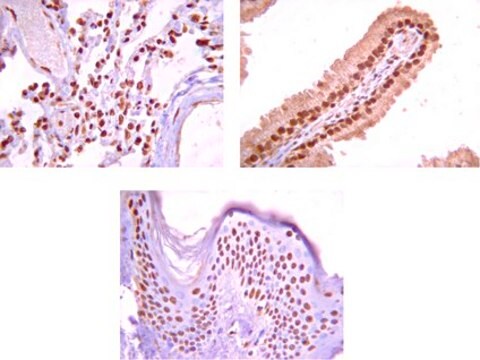MAB4708
Anti-Caspase 8 Antibody, clone 1-1-37
clone 1-1-37, Chemicon®, from mouse
Synonym(s):
MACH1, FLICE
Sign Into View Organizational & Contract Pricing
All Photos(1)
About This Item
UNSPSC Code:
12352203
eCl@ss:
32160702
NACRES:
NA.41
Recommended Products
biological source
mouse
Quality Level
antibody form
purified immunoglobulin
antibody product type
primary antibodies
clone
1-1-37, monoclonal
species reactivity
human
manufacturer/tradename
Chemicon®
technique(s)
western blot: suitable
isotype
Not specified
NCBI accession no.
UniProt accession no.
shipped in
wet ice
target post-translational modification
unmodified
Gene Information
human ... CASP8(841)
General description
Caspase-8 is a 55 kDa protein that binds to the death effector domain (DED) of FADD through an analogous DED domain present in the proform of caspase-8. Recruitment of caspase-8 to the Fas receptor results in oligomerization of the caspase-8 protein, which drives its auto-activation through self-cleavage. Active caspase-8 then proteolytically activates other downstream caspases including caspase-9, which lead to cell death.
Specificity
Highly specific to caspase-8 and shows no cross-reaction with other caspase family members. This antibody recognizes the full length 55kDa caspase 8 on western blots.
Immunogen
Recombinant full-length human caspase-8 protein
Application
Detect Caspase 8 using this Anti-Caspase 8 Antibody, clone 1-1-37 validated for use in WB.
Research Category
Apoptosis & Cancer
Metabolism
Apoptosis & Cancer
Metabolism
Research Sub Category
Caspases
Enzymes & Biochemistry
Caspases
Enzymes & Biochemistry
Western blot: 1:100 - 1:1000
Optimal working dilutions must be determined by end user.
Optimal working dilutions must be determined by end user.
Linkage
Replaces: 04-573; 04-574
Physical form
Format: Purified
Purified immunoglobulin by protein A. Liquid in PBS, pH 7.6, with 0.1% sodium azide.
Storage and Stability
Maintain refrigerated at 2-8°C in undiluted aliquots for up to 12 months.
Other Notes
Concentration: Please refer to the Certificate of Analysis for the lot-specific concentration.
Legal Information
CHEMICON is a registered trademark of Merck KGaA, Darmstadt, Germany
Disclaimer
Unless otherwise stated in our catalog or other company documentation accompanying the product(s), our products are intended for research use only and are not to be used for any other purpose, which includes but is not limited to, unauthorized commercial uses, in vitro diagnostic uses, ex vivo or in vivo therapeutic uses or any type of consumption or application to humans or animals.
Not finding the right product?
Try our Product Selector Tool.
recommended
Product No.
Description
Pricing
Storage Class Code
10 - Combustible liquids
WGK
WGK 2
Flash Point(F)
Not applicable
Flash Point(C)
Not applicable
Certificates of Analysis (COA)
Search for Certificates of Analysis (COA) by entering the products Lot/Batch Number. Lot and Batch Numbers can be found on a product’s label following the words ‘Lot’ or ‘Batch’.
Already Own This Product?
Find documentation for the products that you have recently purchased in the Document Library.
Martha Lappas et al.
Molecular human reproduction, 24(2), 94-109 (2017-12-23)
What is the association between placental formyl peptide receptor 2 (FPR2) and trophoblast and endothelial functions in pregnancies affected by foetal growth restriction (FGR)? Reduced FPR2 placental expression in idiopathic FGR results in significantly altered trophoblast differentiation and endothelial function
Jessica J Huck et al.
Molecular cancer research : MCR, 8(3), 373-384 (2010-03-04)
Aurora A kinase is a serine/threonine protein kinase responsible for regulating several mitotic processes including centrosome separation, spindle assembly, and chromosome segregation. Small molecule inhibitors of Aurora A kinase are being pursued as novel anticancer agents, some of which have
Cheng-Wen Lin et al.
Biomedicines, 8(9) (2020-08-23)
In this study, the anti-tumor activity of ilimaquinone (IQ), a sesquiterpene quinone isolated from marine sponge Halichondria sp., in oral squamous cell carcinoma (OSCC) cells, was investigated. IQ suppressed the viability of the OSCC cell lines SCC4 and SCC2095 with
Activated Cdc42-associated kinase 1 (Ack1) is required for tumor necrosis factor-related apoptosis-inducing ligand (TRAIL) receptor recruitment to lipid rafts and induction of cell death.
Linderoth, E; Pilia, G; Mahajan, NP; Ferby, I
The Journal of Biological Chemistry null
Padma Murthi et al.
Cells, 9(4) (2020-04-16)
We reported earlier that an anti-inflammatory small peptide receptor-formyl peptide receptor-2 (FPR2) was significantly decreased in placentas from third trimester pregnancies complicated with fetal growth restriction (FGR), compared to placentas from uncomplicated control pregnancies, suggesting FPR2 may play a role
Our team of scientists has experience in all areas of research including Life Science, Material Science, Chemical Synthesis, Chromatography, Analytical and many others.
Contact Technical Service








